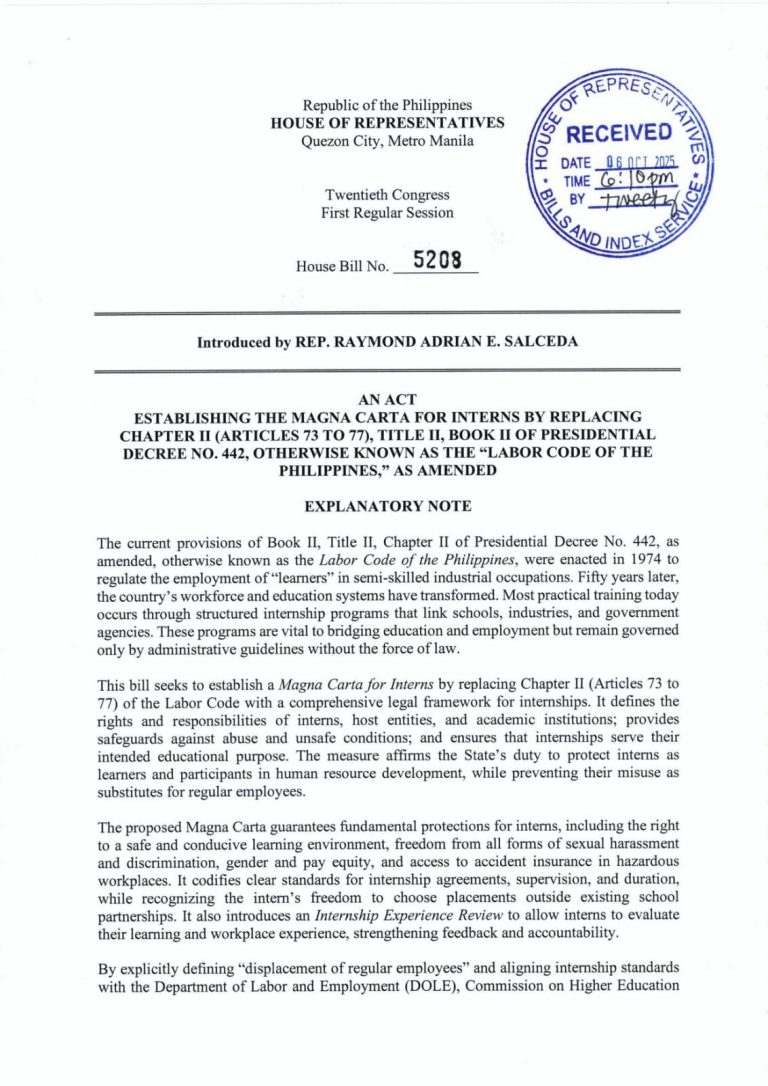
SPEAKER Ferdinand Martin G. Romualdez on Sunday reaffirmed the House of Representatives’ commitment to addressing the pressing concerns of job creation and food security, as highlighted by a recent Social Weather Stations (SWS) survey.
The SWS survey, commissioned by the Stratbase Group and conducted from April 11 to 14, 2025, revealed that 93% of Filipinos would vote for candidates advocating for increased job opportunities and the development of agriculture to ensure food security.
“The survey confirms our legislative direction, a direction we have been proactively pursuing in the past months and years,” said Speaker Romualdez, leader of the 306-strong House of Representatives.
The Lakas-Christian Muslim Democrats (CMD) president noted that over the past two years, the House has shepherded a suite of laws that collectively strengthen the country’s job engine.
Republic Act 11962, or the “Trabaho Para sa Bayan Act,” created a “National Employment Master Plan” that aligns curricula, skills training and apprenticeship with real industry demand. To pull in large-scale investments, RA 11966, or the “Public-Private Partnership Code of 2023,” was passed to unify all scattered PPP rules and streamline approvals, giving big infrastructure projects a stable legal runway.
Digital economy jobs gained momentum with the passage of RA 11967, or the “Internet Transactions Act,” which set up an E-Commerce Bureau to protect online buyers and sellers and professionalize Philippine e-commerce.
For hometown entrepreneurs, RA 11960, or the “One Town, One Product Philippines Act, institutionalized targeted design, finance and marketing support so micro, small and medium enterprises (MSMEs) can scale up and hire locally.
“Ang lahat ng batas na ito, kapag pinagsama-sama, ay lumilikha ng isang buong ecosystem na nagbubukas ng mas maraming oportunidad para sa disenteng trabaho,” Speaker Romualdez explained.
On the food security front, the House paired long-range reforms with immediate relief. RA 11953, or the “New Agrarian Emancipation Act,” condoned ₱57.56 billion in land amortization arrears for 610,054 agrarian-reform beneficiaries cultivating 1.17 million hectares—freeing farmers’ cash flow for seed, fertilizer and machinery that lift yields.
To modernize the rice sector, RA 12078, signed last December 2024, extended the Rice Competitiveness Enhancement Fund to 2031 and tripled the annual allocation to ₱30 billion for mechanization, certified seed, irrigation and soil-health programs.
“Sa pamamagitan ng condonation law at pinalakas na Rice Fund, binibigyan natin ang magsasaka ng tunay na puhunan, hindi lamang pag-asa,” Speaker Romualdez said. “Kapag umani sila nang mas marami at mas mura, lahat tayo ay nakatitipid sa palengke.”
Addressing food affordability, Speaker Romualdez said the House supports the executive-led ₱20 Rice Program, which aims to keep the staple within reach of low-income families while logistics for the nationwide rollout are being finalized.
“The House of Representatives is fully committed to sustaining and expanding the recently launched P20 Rice Program nationwide. This initiative directly addresses the need for affordable food for every Filipino family, especially the most vulnerable. Through the government’s subsidy, strategic procurement, distribution reform, and partnerships with local producers, we will work to make this program a permanent and reliable pillar of our food security efforts that will go beyond political cycles,” Speaker Romualdez explained.
“Our efforts are in lockstep with the Alyansa ng Bagong Pilipinas candidates’ platforms — public servants committed to continuity, reform, and responsive governance. Their platform to prioritize livelihoods, support farmers and fishers, and protect the welfare of workers, both here and abroad, reflects the same values driving our legislative work,” Speaker Romualdez stressed.
The lawyer-legislator revealed that in the coming 20th Congress, the House leadership will focus on passing pending measures to strengthen the job market further and secure the foundation for agricultural modernization and food supply resilience. These include bills to enhance support for micro, small, and medium enterprises (MSMEs), promote agrarian innovation, and improve workers’ rights and welfare.
“This survey is a validation of the path we are already forging—one that leads to decent work, affordable food, and an economy that truly serves all,” Speaker Romualdez concluded. “We remain steadfast in our commitment to legislative actions that uplift the lives of every Filipino.”






